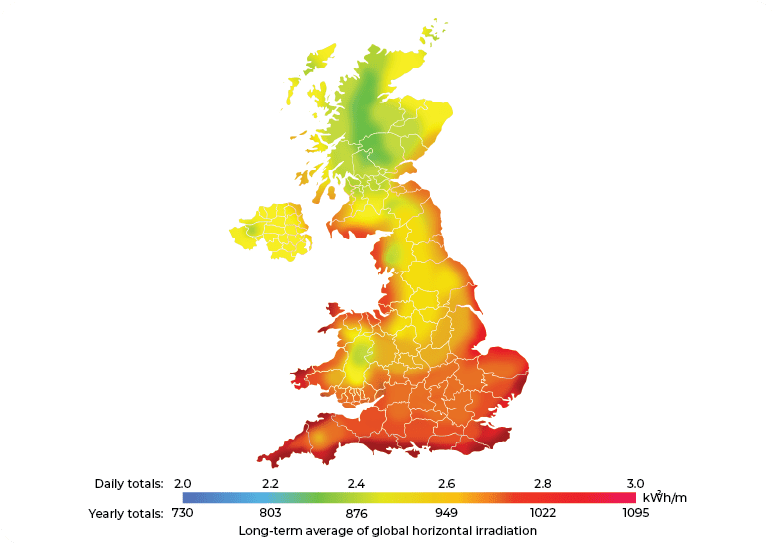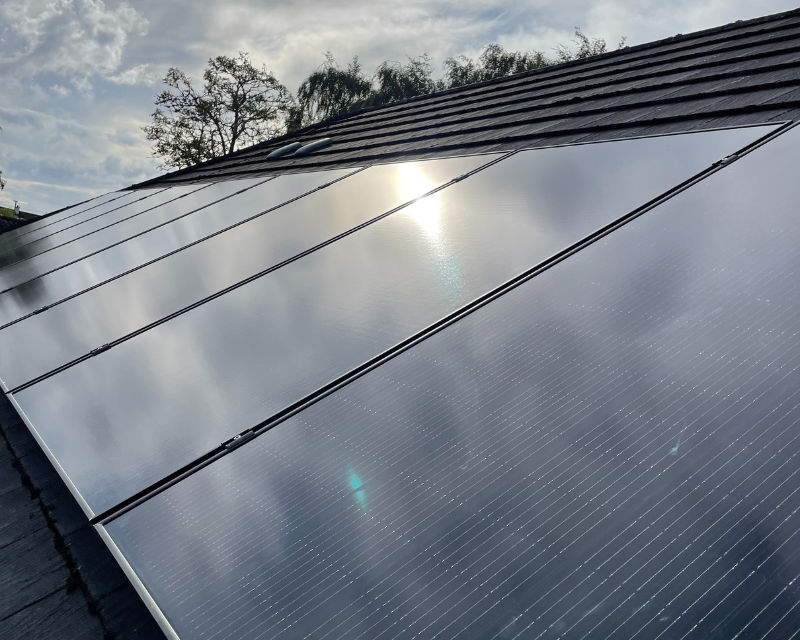If you’re thinking about transitioning to solar energy, it’s natural to wonder if your roof is suitable for solar panels. We understand this concern, which is why we’ve created a helpful checklist to assist you as you embark on your solar journey.
The good news is that the majority of homes in Scotland have roofs that are well-suited for solar panels. To determine if your home is eligible, consider asking yourself a few important questions:
1. Does my roof receive ample sunlight throughout the day?
2. Does my roof have sufficient space to accommodate solar panels?
4. Is my roof in good condition?
5. Does my roof experience significant shading?
By addressing these questions, you’ll gain a clearer understanding of whether your roof is a suitable candidate for solar panels.
Roof Orientation
The orientation of your roof plays a crucial role in determining its suitability for solar panels. Since the sun rises in the east and sets in the west, it’s important for solar panels to have access to as much sunlight as possible in order to generate maximum output.

Ideally, your roof should be south-facing, as this orientation receives the most sunlight throughout the day. However, east and west-facing roofs can still be viable options, as they receive sunlight during different parts of the day. North-facing roofs, on the other hand, may not be as suitable for solar panel installation, as they receive less direct sunlight, especially in Inverness.

The diagram above illustrates how different roof orientations can affect the suitability of your roof for solar panels. A south-facing roof is generally considered the best option for solar panels, as it receives the most sunlight throughout the day. This orientation allows for maximum exposure to the sun’s energy during its most intense period, typically around midday. As a result, solar panels on a south-facing roof tend to generate the highest electricity output.
However, if you have an east or west-facing roof, you can still have a solar panel system that performs well. These orientations provide exposure to sunlight in the morning, afternoon, and evening, allowing for decent energy production throughout the day.
On the other hand, a north-facing roof may not be suitable for solar panels. This orientation receives less direct sunlight, which directly impacts the generation potential of the solar panel system.
During the assessment of your roof for solar panel installation, it is important to consider its orientation to ensure optimal energy production. Our team at CalTech Energy will evaluate your roof’s orientation and other factors to determine the best solution for your solar energy needs.
Roof Space
It is indeed true that the size of your roof plays a significant role in determining the number of solar panels you can install and the amount of power you can generate. The more roof space available, the more panels you can fit and the more electricity you can produce.
In the UK, 400W solar panels have become the industry standard for installations. To cover a typical home’s energy bill, a recommended 4kW solar PV system would require the capacity to install at least 10 x 400W solar panels. However, if you have additional energy needs such as charging an electric car, heating water, or running electric radiators, you would need a larger system.
To achieve a higher level of grid independence, it is crucial to determine how many panels your roof can accommodate. Various obstacles like skylights, roof vents, and chimneys can impact the layout and installation of solar panels. During the early stages of considering solar, it can be helpful to look at neighbouring installations to get an idea of how many solar panels your roof can accommodate.
Understanding the potential capacity of your roof and working with experienced solar installers like CalTech Energy can help you design a system that maximizes your energy production and meets your specific needs.
Roof Condition
To ensure the successful installation of solar panels on your property, it’s important to have a sturdy and secure roof that can support the weight of the panels. Before proceeding with the installation, it’s recommended to have certified installers, like CalTech Energy, assess the condition of your roof and determine its structural soundness. Keep an eye out for signs of a damaged roof such as falling mortar, decaying underlay, loose or missing tiles, the growth of mould or moss, as well as water damage and rotting in roof trusses, battens, or purlins. If your roof is in poor condition, it’s essential to address any necessary repairs or treatments before considering solar panels.
On the other hand, it’s worth considering the impact of installing solar panels on a newly installed roof. It’s advisable to consult with CalTech Energy beforehand as this may affect your warranty. Open communication with us will help ensure that the installation of solar panels doesn’t compromise any existing warranties.
Roof Shading
Determining the suitability of your home for solar panels often revolves around the crucial factor of shading. Shading can significantly limit the amount of sunlight reaching your roof, thus reducing the output of your solar system.
Various external elements can cause shading, such as nearby trees, buildings, chimneys, satellites, and waste vents.
Even if shading only affects a single panel, it affects the overall performance of your entire solar system since panels are wired together in a series. Thankfully, there are technologies available to mitigate the impact of shading on solar panels, known as DC Power Optimisers. Opting for the installation of SolarEdge panel optimizers brings several benefits, albeit at an additional cost to your overall installation.
By designing a well-thought-out solar panel system, it is possible to minimize the negative effects of shading. That’s why it is crucial to consult with an expert from CalTech Energy during the design phase, as they can identify potential shading factors.
Conclusion
Even if your roof doesn’t meet the ideal requirements for solar panels, it can still be a viable option with the right approach. Consulting with us can provide valuable insights into different designs and technologies that can maximize your system’s performance. Whether it’s roof-mounted or ground-mounted solar panels, our team offers various installation options to ensure that going solar is feasible for every household, business, and community.
If you’re a homeowner or business owner in the UK and want to determine if your roof is suitable for solar panels, don’t hesitate to contact us today. Our trained specialists provide free remote surveys and designs to assess your home’s suitability for solar energy.


